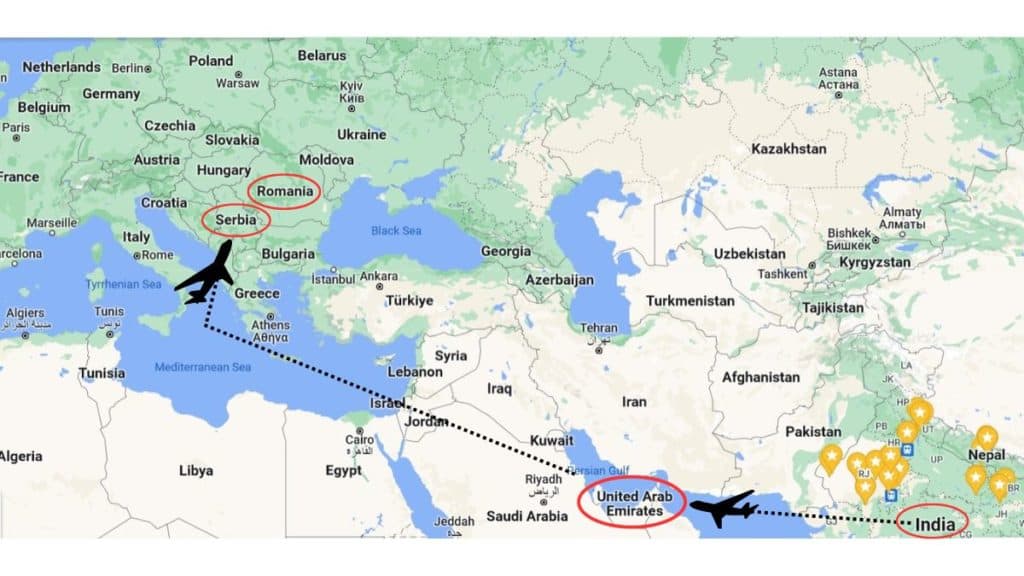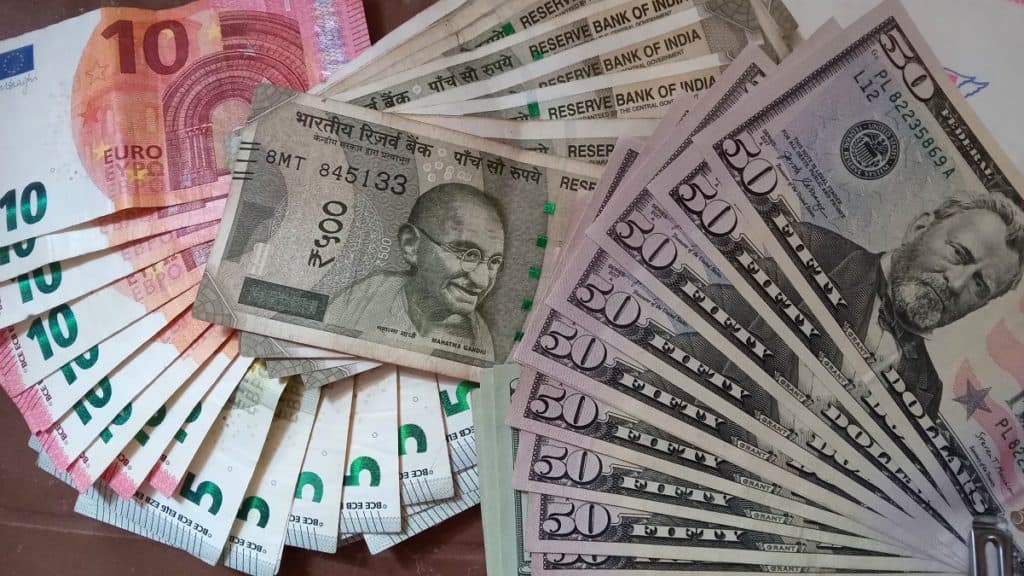Last Updated on October 25, 2024 by Ellen
My last blog post/rant about the U.S. debt default dilemma has resulted in some “cautionary measures” by us overseas Earth Vagabonds.
Yep. Despite our continued hope and expectation that our elected officials/buffoons will avert a major calamity – we had to do something.
We’re leaving India next week and will be slow traveling in June and July. We’ll be relying on ATMs, money exchanges, and credit cards. We need them to work. We’ll need access to UAE dirham, Serbian dinar, and Romanian leu in order to survive.

U.S. debt default defense plays while abroad
We’ve heard from a few other global nomads — but nobody knows the best way to guard against a U.S. fiscal grenade and its worldwide shrapnel.
Here’s the few things we could reasonably do to prepare for potential financial chaos.
Cash currencies
I exchanged some dollars for euros. The Indian clerk at the corner money exchange seemed happy to make about six percent on the transaction. I have no idea if he’s aware of America’s default danger – and I wasn’t gonna tell him.
Anyway, we now have about €225 (yes, €uros). Pretty small change, but we feel better holding SOME other internationally accepted cash. It could last a few days in an emergency. In addition, we still have dollars – more than $750 stashed with our passports.
Wire transfer
We’ve initiated an online $1,000 Western Union money transfer to ourselves from our U.S. bank account. The corresponding dirham can be picked up in the UAE anytime within the next 10 days using the secret transaction code and passport ID at a Western Union agent.
We got a confirmation email saying 3,281 UAE dirham are ready for pickup. We’ll see. It seemed like a way to ‘lock in’ today’s exchange rate. But if the U.S. dollar went haywire, who’s to say money exchanges/remitters would even be open, or cooperate ten days from now. The money automatically ‘bounces’ back to the funding account if not claimed. Unknown about wild currency fluctuations at that time.
Digital payments as cash backup
For the first time, I’ve got Google Pay connected to a U.S. credit card account (with no foreign fees) and activated on my Android phone. Ellen has begun the Apple Pay activation procedures on her iPhone. Additionally, I’ve started studying the PayPal wallet features in case that could ever be helpful.
Both Google Pay and Apple Pay say their payments are ‘supported’ in the countries we’ll be visiting – but we don’t know how widespread merchant acceptance is. We never saw either used in India (they use PayTM). Of course, we have made sure to accurately update the ‘travel notifications’ for our standard credit, debit, and ATM cards, too.

Airbnb bookings
We now have confirmed Airbnb bookings until mid-October. Airbnb is holding our payments in a kind of ‘escrow’. As I mentioned in my previous post, I could find no language in the Airbnb terms and conditions specific to never-before-seen currency gyrations. And who knows about any given host/landlord confronted with a ‘devalued’ future payment from Airbnb?
Again, as foreign travelers, we’d be at the mercy of these various other entities – with little immediate recourse in any dispute. Still, it seemed wise to make the reservations – and have a contract. The only other downside: if economies slow or halt in a crisis, travel rental rates might quickly decrease due to a demand drop. But honestly, at our price point of $600 to $800 per month, such reductions would be far smaller on a dollar basis compared to places renting for thousands. We do, in actuality, have a couple travel weeks unbooked between our month-long stays in the Balkans.
Defensive investment plays
Lastly, bigger picture: we’ve upped the cash portions of our investment and retirement accounts. (Our bond fund holdings remain unchanged – and small). We normally keep three to four years of ‘living expenses’ in cash. At present we are more than double that. And we plan to soon move into some higher interest bearing money markets and CDs – at least temporarily.
This week I’ve trimmed winners and losers and chopped anything unchanged. Bottom line, it’s probably a good move regardless of the debt ceiling issue. Inflation remains persistent, interest rates could go higher, a recession is looming, banks are wobbling, commercial real estate is a concern, Russia and China tensions continue, more political insanity is ramping. A second-half 2023 stock market move lower could be reasonably expected. Protected extra cash might then deployed more effectively.
Finally, we’ve also been looking into the global payments service “Wise” (formerly TransferWise). Their multi-currency wallets option are something we’d be very interested in the future – but probably can’t activate now.

Political buffoons caused U.S. debt default defense need
In closing, a disgusting quote from a NY Times piece by Jeff Sommer, which sums up the problem.
“The debt ceiling crisis is a symptom of political dysfunction. Bizarrely, the United States has the ability to pay its debts but may not do so because of an inability to achieve a political consensus.”
– Jeff Sommer, New York Times
As always, be thankful and generous happy trails & more beer.
Life is NOW!
Thanks for reading, “U.S. debt default defense.”
See what it costs to retire early and travel the world!
Check out our popular monthly budget breakdowns.


